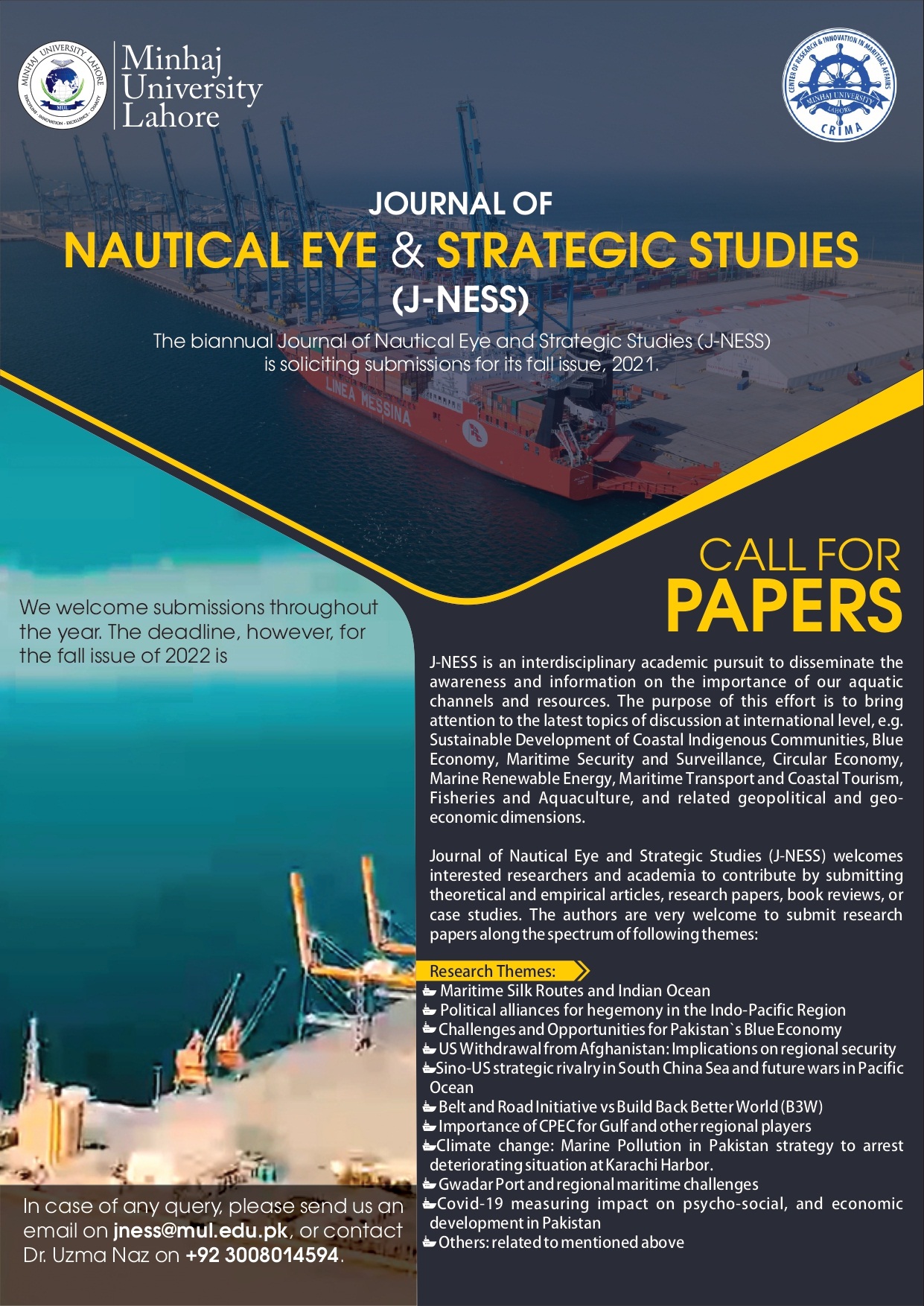Evolving Geopolitics and Security Dynamics in the Indian Ocean Region: An Analytical Overview
DOI:
https://doi.org/10.58932/MULG0037Keywords:
Indian Ocean Region (IOR), Security Architecture, Belt and Road Initiative (BRI), Security and Growth in the Region (SAGAR), Maritime Silk Road (MSR).Abstract
The political and security landscape of the Indian Ocean Region (IOR) is changing, giving it greater strategic significance. China's regional policy and Belt and Road Initiative pose a threat to existing powers, and India's changing approach in the Indo-Pacific region (IOR) reflects worries about China's economic impact and ascent. With programs like the Act East plan, outreach into the western Indian Ocean, and the Security and Growth in the Area (SAGAR) framework, India is demonstrating its leadership. This emphasizes the viewpoints that are often ignored in international geopolitics. The third-largest ocean in the world, the Indian Ocean, is a vital center for international trade and geopolitics. It is home to important chokepoints for trade and the movement of energy, such as the Straits of Hormuz and Malacca. Important factors include cultural variety, environmental concerns, and marine security, with the US, China, and India vying for influence. It continues to be strategically important due to its rich cultural legacy, continuous regional organizations, a combination of economic prospects, and geopolitical concerns. Global politics and trade are changing as a result of China's Belt and Road Initiative (BRI), especially the Maritime Silk Road (MSR) in the Indian Ocean area (IOR). It improves value chains, trade, and connectivity but also presents obstacles, most notably the China-Pakistan Economic Corridor (CPEC). India attempts to impose regional leadership and balance off China's influence, and this has a significant geopolitical impact on its approach to maritime administration. However, because it limits the focus on governance operations, creates bureaucratic obstacles, and opposes Chinese collaboration, this policy makes it more difficult for India to handle important maritime governance challenges. The study will look into the strategies and security concerns of the countries around the western Indian Ocean, including India's security partnerships and its strategic objectives. Along with examining US efforts to retain influence in the developing IOR which is shifting from US dominance in conventional security to a multilateral balance, it will also examine China's ambitions and India's quest for a new order. It is anticipated that conventional security patterns will not change despite these changes. Natural disasters, terrorism, piracy, and climate change are examples of non-traditional security threats that still exist in the Indian Ocean Region, even in places where these threats are on the decline.
References
Anwar, U., & Hussain, D. Z. (2023). Game Changer for Pakistan: Significance of Gawadar for Pakistan Economy & Factors of Underutilization of Gawadar Port. Journal of NauticalEye and Strategic Studies, 3(1), 154–178. https://doi.org/10.58932/MULG0017
Arrfat, Y. (2018). Challenges and SolutionsIn Building CPEC-A Flagship of BRI.
Challengesthe, S., & Ocean, I. (2018). C En Re St Challenges in the Indian. March 1997.
Fernando, S. G. (2021). GEOPOLITICS AND ITS IMPACT ON MARITIME SECURITY : SPECIAL Multidisciplinary. May.
India-eu, F., Collaboration, T., Krishnamurthy, R., & Ghiasy, R. (2022). The Transitioning Security Order in the Indo-Pacific.
Khan, M. Z. (2022). Geopolitics of the Indian Ocean Region and Challenges for the China-Pakistan Economic Corridor. November.
Khan, M. Z., & Altaf, Z. (2022). China’S Foreign Policy Shift From Belt and Road Initiative To Global Development Initiative: Impacts on Maritime Geopolitics of the Indian Ocean Region. Margalla Papers, 26(2), 14–27. https://doi.org/10.54690/margallapapers.26.2.119
Khan, N. A. (2018). Geo-Political Significance of Gwadar Port: Challenges and Prospects. Journal of Security and Strategic Analyses, 4(1), 86–107.
Khizar, S. (2023). New Dynamics in Indian Ocean: A study of Pakistan, China and India under Regional Security Complex. Journal of Nautical Eye and Strategic Studies, 3(1), 79–94. https://doi.org/10.58932/MULG0013
Malone, D. M. (2015). India’s Contemporary Security Challenges. In Does the Elephant Dance? https://doi.org/10.1093/acprof:osobl/9780199552023.003.0003
Michael, S. (2007). Terrorism a socio-economic and political phenomenon with special reference to pakistan. Journal of Management and Social Sciences, 3(1), 35–46.
Muhammad Faisal. (2019). CPEC and Regional Connectivity: Navigating the South Asian Politics. Strategic Studies, 39(2), 1–17. https://doi.org/10.53532/ss.039.02.00108
Pandey, S. (2023). NON-TRADITIONAL MARITIME THREATS TO SECURITY IN INDIAN OCEAN REGION. July. https://doi.org/10.1729/journal.33823
Rahman, Z. U., Khan, A., Lifang, W., & Hussain, I. (2021). The geopolitics of the CPEC and Indian Ocean: security implication for India. Australian Journal of Maritime and Ocean Affairs, 13(2), 122–145. https://doi.org/10.1080/18366503.2021.1875807
Rodrigo, D. (2021). Indian Ocean Geopolitics - Report on the Politics in the Indian Ocean. Ssrn, 1–19. https://ssrn.com/abstract=3783748
Shah, S. A. H., Rafique, D. M. U., & Rasool, S. (2020). Geopolitical Implications of the Indian Ocean and Maritime Security Challenges for Pakistan. Journal of Peace, Development & Communication, 04(02), 431–451. https://doi.org/10.36968/jpdc-v04-i02-23
Van Der Putten, F.-P., Wetzling, T., & Kamerling, S. (2014). Geopolitics and Maritime Security in the Indian Ocean: What Role for the European Union? The Hague Institute for GLobal Justice, August. http://www.washingtontimes.com/
Zhou, Yang, & Wang. (2020). CHINA PAKISTAN ECONOMIC CORRIDOR (CPEC) IN PERSPECTIVE OF TERRORISM: AN ANALYSIS. File:///C:/Users/VERA/Downloads/ASKEP_AGREGAT_ANAK_and_REMAJA_PRINT.Docx, 21(1), 1–9.
Downloads
Published
How to Cite
Issue
Section
License
Copyright (c) 2024 Journal of Nautical Eye and Strategic Studies

This work is licensed under a Creative Commons Attribution-NonCommercial 4.0 International License.











